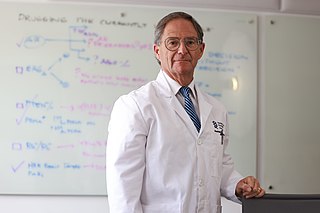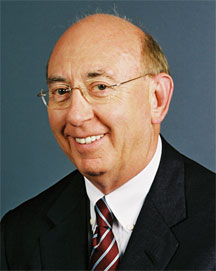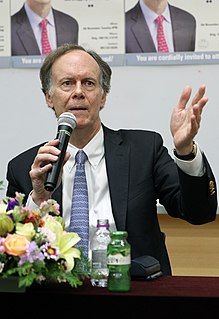Related Research Articles

The Johns Hopkins Hospital (JHH) is the teaching hospital and biomedical research facility of the Johns Hopkins School of Medicine, located in Baltimore, Maryland, U.S. It was founded in 1889 using money from a bequest of over $7 million by city merchant, banker/financier, civic leader and philanthropist Johns Hopkins (1795–1873). Johns Hopkins Hospital and its school of medicine are considered to be the founding institutions of modern American medicine and the birthplace of numerous famous medical traditions including rounds, residents and house staff. Many medical specialties were formed at the hospital including neurosurgery, by Harvey Cushing and Walter Dandy; cardiac surgery by Alfred Blalock; and child psychiatry, by Leo Kanner. Attached to the hospital is the Johns Hopkins Children’s Center which serves infants, children, teens, and young adults aged 0–21.

The Indiana University School of Medicine has nine campuses throughout Indiana; the principal research and medical center is located on the Indiana University – Purdue University Indianapolis campus in Indianapolis. With 1,409 M.D. Program students and 158 Ph.D. students in 2017, IU is one of the largest allopathic medical schools in the United States. The school offers several joint-degree programs, including an MD/MBA, MD/MA, MD/MPH, and an MD-PhD Medical Scientist Training Program. The university is the American medical school with the largest number of physicians in the United States per the 2018 Federation of State Medical Boards Survey with 11,828 licensed physicians.

Memorial Sloan Kettering Cancer Center is a cancer treatment and research institution in New York City, founded in 1884 as the New York Cancer Hospital. MSKCC is the largest and oldest private cancer center in the world, and is one of 51 National Cancer Institute–designated Comprehensive Cancer Centers. Memorial Sloan Kettering is affiliated with Cornell University's medical school. Its main campus is located at 1275 York Avenue, between 67th and 68th streets, in Manhattan.
Lawrence Einhorn is an oncologist at Indiana University School of Medicine. A pioneer in cancer treatment research, Einhorn developed cisplatin-based chemotherapy regimens that increased cure rates while minimizing toxic side effects.

Charles Gordon Zubrod was an American oncologist who played a prominent role in the introduction of chemotherapy for cancer. He was one of the recipients of the 1972 Albert Lasker Awards in recognition of his contributions to the field, amongst many other doctorates and awards.
National Comprehensive Cancer Network (NCCN) is an alliance of 31 cancer centers in the United States, most of which are designated by the National Cancer Institute as comprehensive cancer centers. It is a non-profit organization with offices in Plymouth Meeting, Pennsylvania. Ronald S. Walters, MD, MBA, MHA, MS, from The University of Texas MD Anderson Cancer Center, is chairman of the NCCN Board of Directors. It publishes the peer-reviewed medical journal Journal of the National Comprehensive Cancer Network.
James Lewis Abbruzzese is the Chief of the Duke Division of Medical Oncology and Associate Director for Clinical Research for the Duke Cancer Institute. Previously, Abbruzzese was Chairman of the Department of Gastrointestinal Medical Oncology at the University of Texas M. D. Anderson Cancer Center where he held the M. G. and Lillie A. Johnson Chair for Cancer Treatment and Research and the Annie Laurie Howard Research Distinguished Professorship. Abbruzzese is one of the world's leaders in the clinical study and treatment of pancreatic cancer.
Harry F. Bisel, M.D. (1918–1994) was an American oncologist. With Fred Ansfield, Herman Freckman, Arnoldus Goudsmit, Robert Talley, William Wilson, and Jane Wright, was one of the founding members of the American Society of Clinical Oncology (ASCO). This group of pioneering doctors, through the formation of ASCO, is largely credited with the development of modern American clinical oncology. In 1964, Bisel was elected the first president of ASCO. He was active in the American Cancer Society and was a consultant to the National Cancer Institute. Bisel was a founding member of the American Society of Preventive Oncology as well as the American Association for Cancer Education.

Jonathan W. Simons is an American physician-scientist, medical oncologist, and leader in prostate cancer research. In August 2021, Simons was appointed the Medical Director and Chief Science Officer of the Marcus Foundation. Prior to joining the Marcus Foundation, he served a 14-year tenure as the President and chief executive officer of the Prostate Cancer Foundation. Simons’ laboratories, partly funded by the Prostate Cancer Foundation, at Johns Hopkins University and Emory University made original contributions to understanding the molecular biology of prostate cancer metastasis and principles of “broken immune tolerance” via T cell based immunotherapy for prostate cancer. The Simons lab invented GM-CSF genetically engineered vaccines for prostate cancer in rodents and humans for these studies, and subsequently Simons’ clinical team took the biotechnology into the world’s first human gene therapy clinical trials for advanced prostate cancer at Johns Hopkins.

David B. Agus is an American physician and author who serves as a professor of medicine and engineering at the University of Southern California Keck School of Medicine and Viterbi School of Engineering and the Founding Director and CEO of USC’s Lawrence J. Ellison Institute for Transformative Medicine. He is also the cofounder of several personalized medicine companies and a contributor to CBS News on health topics.

The UPMC Hillman Cancer Center (Hillman), previously titled the University of Pittsburgh Cancer Institute (UPCI), is a National Cancer Institute (NCI)-designated Comprehensive Cancer Center located in the Hillman Cancer Center in the Shadyside neighborhood of Pittsburgh, Pennsylvania, United States, adjacent to UPMC Shadyside. The only NCI-designated cancer center in Western Pennsylvania, Hillman is composed of collaborative academic and research efforts between the University of Pittsburgh, the University of Pittsburgh Medical Center (UPMC), and Carnegie Mellon University. Hillman provides clinical cancer care to some 74,000 patients treated at its facilities at both the Hillman Cancer Center location in the Shadyside neighborhood of Pittsburgh and at UPMC-affiliated sites throughout Pennsylvania, New York, Ohio, and overseas locations. Founded in 1984, Hillman became the youngest cancer center in history to achieve NCI-designation. As of 2007, Hillman had received nearly $200 million in funding from the National Cancer Institute, which ranks it as one of the top ten cancer research institutes.

John E. Niederhuber, MD was the 13th director of the National Cancer Institute (NCI), from 2006 until July, 2010, succeeding Andrew von Eschenbach, who went on to become a director at biotechnology firm BioTime. A nationally renowned surgeon and researcher, Dr. Niederhuber has dedicated his four-decade career to the treatment and study of cancer - as a professor, cancer center director, National Cancer Advisory Board chair, external advisor to the NCI, grant reviewer, and laboratory investigator supported by NCI and the National Institutes of Health. He is now Executive Vice President/CEO Inova Translational Medicine Institute and Inova Health System and Co-Director, Johns Hopkins Clinical Research Network.

William G. Kaelin Jr. is an American Nobel Laureate physician-scientist. He is a professor of medicine at Harvard University and the Dana-Farber Cancer Institute. His laboratory studies tumor suppressor proteins. In 2016, Kaelin received the Albert Lasker Award for Basic Medical Research and the AACR Princess Takamatsu Award. He also won the Nobel Prize in Physiology or Medicine in 2019 along with Peter J. Ratcliffe and Gregg L. Semenza.
Nancy E. Davidson is the executive director and president of Seattle Cancer Care Alliance, senior vice president, director of clinical oncology at Fred Hutchinson Cancer Research Center and head of the Division of Medical Oncology at the University of Washington School of Medicine. She focuses her research on breast cancer treatments and the genes that are mutated in various forms of breast cancer. She was president of American Association for Cancer Research from 2015 to 2016 and president of American Society of Clinical Oncology from 2007 to 2008.
Kenneth C. Anderson is an American hematologist-oncologist and cancer researcher who is primarily known for advances in the treatment of multiple myeloma. He directs the Lebow Institute for Myeloma Therapeutics and Jerome Lipper Myeloma Center at Dana-Farber Cancer Institute and is the Kraft Family Professor of Medicine and Vice Chair of the Joint Program in Transfusion Medicine at Harvard Medical School.
Scott M. Lippman is the director of Moores Cancer Center at the University of California, San Diego and Professor of Medicine at UC San Diego School of Medicine.

Elizabeth M. Jaffee is an American oncologist specializing in pancreatic cancer and immunotherapy.

Julie Ann Sosa, MD, MA, FACS, is professor and chair of the Department of Surgery at the University of California, San Francisco (UCSF) and holds the Leon Goldman, MD, Distinguished Professorship in Surgery. She currently serves as the Treasurer of the American Thyroid Association and Editor-in-Chief of the World Journal of Surgery.

Brigid Gray Leventhal was a British-American pediatric oncologist. She was the first director of the Pediatric Oncology Division at Johns Hopkins University, a position she held from 1976 to 1984. She was inducted into the Maryland Women's Hall of Fame in 1996.
Timothy Michael Pawlik is an American oncologist. He is the Chair of Surgery at Ohio State University Wexner Medical Center and the Urban Meyer III and Shelley Meyer Chair for Cancer Research.
References
- 1 2 3 "James G Herman, MD". University of Pittsburgh Medical Center. Retrieved 9 December 2018.
- ↑ "James Gordon Hillman, MD". University of Pittsburgh Cancer Institute.
- ↑ "Epigenetics Dream Team Members". Johns Hopkins University School of Medicine. Retrieved 9 December 2018.